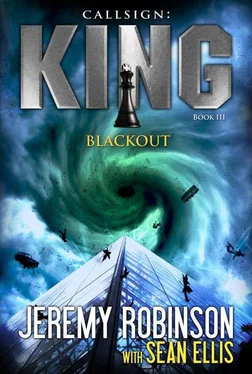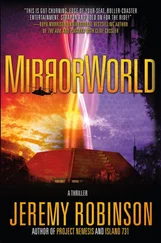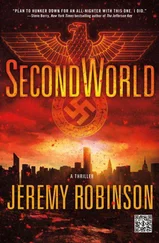Jeremy Robinson - Blackout
Здесь есть возможность читать онлайн «Jeremy Robinson - Blackout» весь текст электронной книги совершенно бесплатно (целиком полную версию без сокращений). В некоторых случаях можно слушать аудио, скачать через торрент в формате fb2 и присутствует краткое содержание. Жанр: Триллер, на английском языке. Описание произведения, (предисловие) а так же отзывы посетителей доступны на портале библиотеки ЛибКат.
- Название:Blackout
- Автор:
- Жанр:
- Год:неизвестен
- ISBN:нет данных
- Рейтинг книги:4 / 5. Голосов: 1
-
Избранное:Добавить в избранное
- Отзывы:
-
Ваша оценка:
- 80
- 1
- 2
- 3
- 4
- 5
Blackout: краткое содержание, описание и аннотация
Предлагаем к чтению аннотацию, описание, краткое содержание или предисловие (зависит от того, что написал сам автор книги «Blackout»). Если вы не нашли необходимую информацию о книге — напишите в комментариях, мы постараемся отыскать её.
Blackout — читать онлайн бесплатно полную книгу (весь текст) целиком
Ниже представлен текст книги, разбитый по страницам. Система сохранения места последней прочитанной страницы, позволяет с удобством читать онлайн бесплатно книгу «Blackout», без необходимости каждый раз заново искать на чём Вы остановились. Поставьте закладку, и сможете в любой момент перейти на страницу, на которой закончили чтение.
Интервал:
Закладка:
King did not relax his guard as he manhandled Brown up the gangplank and onto the reception deck. “Take me to Pradesh.”
The security man slowly holstered his pistol and gestured for King to follow. The murmuring crowd parted to allow them through and a few moments later, they entered the deserted casino. “What’s going on out there?” the guard asked. “An earthquake or something?”
King wondered if the inquiry was an attempt to distract him as a precursor to some treacherous action, but the man’s tone sounded genuine. Brown probably hadn’t shared the details of his plan with his hired guns. “That’s what I’m here to find out. Your boss here knows, but he’s not telling. That’s why I need to talk to Pradesh.”
“He’s not my boss,” the mercenary replied. “At least I don’t think he is. We get all our orders by text message, and right now no one’s answering.”
“Don’t expect that to change. Brainstorm is finished.” King appraised the man a moment longer. “But if you’re not ready for the unemployment line, I could probably find some work for you.”
The mercenary gave him a sidelong glance. “You work for the government, right? A white hat?”
“Something like that.”
The man chuckled. “Hell, why not? The name’s Rick Chesler. I’d shake on it, but I can see you’ve got your hands full right now.”
King nodded. He still had reservations about Chesler’s abrupt change of loyalties, but he was a mercenary-changing loyalties to whoever cut the checks was part of the job. Plus, King’s instincts told him the man was genuine-not all mercs were cold-blooded-and right now he needed all the help he could get.
The awakening was not merely an end to the long period of dormancy-something which itself possessed no meaning for the entity. It had not “known” that it had been sleeping any more than it was aware that it had existed at all prior to this moment in time. But now it knew.
It was not alive, not by any human definition at least. But like a virus, following the inexorable dictates of its internal chemistry, the entity was attuned to its surroundings and possessed of a singular purpose.
As with everything else in the universe, it was bound by the laws of nature. Existence required energy, and while the entity did not hunger for sustenance, the infusion of raw matter triggered a positive feedback loop; as mass was added, its internal gravity increased, which in turn attracted still more material, exponentially increasing intensity.
But that was not the purpose that now defined the entity.
It did not yet perceive the physical world, but it was self-aware, and it further grasped that this awareness was fractured, divided into several different parts. Though this essential awareness derived from the fractured parts of what it would eventually recognize as its mind, it understood that to take that next step, it would be necessary to bring together those parts, joining them to each other, and joining together with them.
To do that, it needed a proxy, and so cleaving off a hint of its own substance, it fashioned the manifestation, and sent it forth into the world.
30
The journey from the ruins of the exhibition hall to the front exit of the Louvre was a blur to Fiona. She moved in a daze, struggling to make sense of everything that had happened.
First, there was Alexander’s dire prognosis: Gamma radiation… A lethal concentration…
What did that even mean? She didn’t feel any different. Maybe he’d been wrong. Or maybe the gamma rays would affect them differently. Maybe they’d all get mutant superpowers…like Bruce Banner in the Incredible Hulk comics.
Then the world had turned upside down.
Sara’s flashlight, augmented by the occasional glow of battery operated emergency lights scattered throughout the corridors, revealed rubble strewn corridors that bore little resemblance to the ornate museum through which she had passed only a few minutes before.
Along the way, they encountered other museum patrons being guided to safety by Louvre personnel. The need for an alternate evacuation route became apparent when she stepped out into the Cour Napoleon-Napoleon’s Courtyard-and caught a glimpse of the twisted steel frame that had once been the elaborate glass pyramid guarding the front entrance to the Louvre. The seventy-foot high structure groaned and creaked in the grip of tidal forces, the sound punctuated every few seconds by the noise of another glass pane breaking free and shattering on the ground below.
Fiona expected to find a cordon of emergency vehicles lined up outside, and beyond that, a world unaffected by the chaos that had swept out of the exhibition hall, but to her dismay she discovered that the legendary City of Lights was almost completely dark.
Alexander separated them from the crowd, but did not take them far. He directed them to sit on the ground, well away from any hazards, and without preamble, launched into a story. Although Sara had been the most vocal in demanding answers, Alexander’s gaze remained fixed on Fiona as he spoke, a fact that did not escape the girl’s notice.
“Nearly seventeen hundred years ago, the residents of the Bamiyan Valley, in what is now Afghanistan, encountered a strange phenomenon. They called it Angra Mainyu, believing it to be the devil of Zorastrian mythology. In reality, it was something even stranger: a micro black hole.
Julia shook her head in confusion. “I thought black holes were the remains of collapsed stars.”
“The term ‘black hole’ applies to any region of space where the local gravity is so powerful that not even light can escape. It has long been believed that when a star uses up all of its fuel, its own gravity causes it to become a black hole-a concentration of stellar mass in something perhaps only a few miles in diameter. But that is only one type of black hole. Almost forty years ago, scientists posited the existence of very small black holes, caused spontaneously by cosmic rays or particle collisions. They have even tried to produce micro black holes at the Large Hadron Collider in Switzerland.”
“They’re making black holes in a laboratory?” Fiona said. “That doesn’t sound very smart.”
“Most micro black holes are unstable and cease to exist in a matter of nanoseconds. Unlike stellar mass black holes, they don’t have enough mass or energy to do any harm, much less achieve any kind of stability. The anomaly encountered by the Bamiyan villagers was different though. It was stable. Though probably only a few molecules in diameter, it had a mass equivalent to Mount Everest. The gravitational effects were localized; the event horizon was probably only about a meter, but anything-even particles of atmosphere-caught in the event horizon would have been added to its mass, increasing if only incrementally, the gravitational attraction. In time, it would have grown large enough to consume the entire planet.”
“Hang on,” Sara said. “You said this micro black hole was stable. What made it different?”
“And what stopped it?” Fiona added.
“I can no more tell you the reason for its stability than I can explain where it originated. But to answer your question Fiona…” Alexander cast a glance at Julia, and then chose his words carefully. “According to one report, the evil of Angra Mainyu ended when a traveling group of Buddhist monks taught the villagers a mantra.”
“A mantra?” Julia made no effort to hide her skepticism.
Fiona however understood. Alexander had been there; one thousand seven hundred-odd years ago, the immortal Hercules had witness these events, had actively participated in them. Fiona also understood all too well the power that could have been unleashed with something seemingly as commonplace as a chanted mantra.
Читать дальшеИнтервал:
Закладка:
Похожие книги на «Blackout»
Представляем Вашему вниманию похожие книги на «Blackout» списком для выбора. Мы отобрали схожую по названию и смыслу литературу в надежде предоставить читателям больше вариантов отыскать новые, интересные, ещё непрочитанные произведения.
Обсуждение, отзывы о книге «Blackout» и просто собственные мнения читателей. Оставьте ваши комментарии, напишите, что Вы думаете о произведении, его смысле или главных героях. Укажите что конкретно понравилось, а что нет, и почему Вы так считаете.












